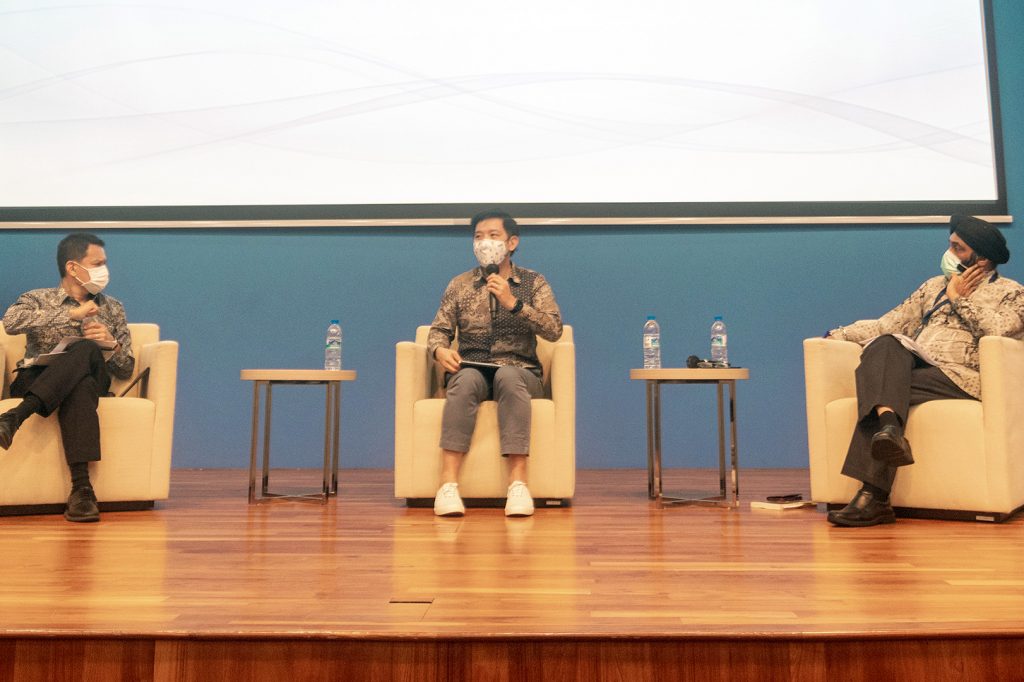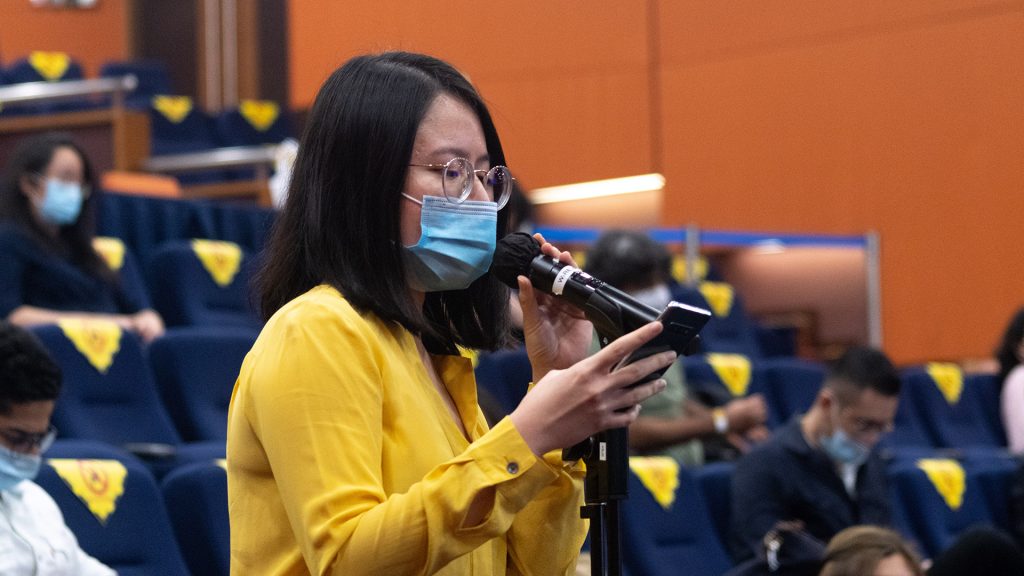Is Change in Singapore Too Fast, Too Furious?
October 20, 2021
IN BRIEF | 3 min read
-
As part of the NUS Students’ Political Association’s (NUSPA) 45th anniversary, the association published "On The Road: A Collection of Essays and Articles From NUSPA Publications". The book highlights Singapore’s major transformations in its political, societal and economic landscape through 39 essays and interviews from the 1980s till today.
- At the book event, Guest of Honour, Mr Alvin Tan, former Facebook Head of Public Policy, and Trust & Safety, who is now Singapore’s Minister of State for Culture, Community and Youth, and Trade and Industry, touched on crises through the decades that effect change. “You have the Savings and Loan Crisis, Asian Financial Crisis, Gulf War Crisis, Dot-com Crisis, September 11, SARS, Global Financial Crisis,” he noted in his opening speech.

At the Facebook head office in Silicon Valley, which used to be the premises for the now-defunct American technology company Sun Microsystems, the Sun logo is still kept on the glass facades.
It serves as a reminder to Facebook employees not to take their success for granted, shared Mr Alvin Tan, former Facebook Head of Public Policy, and Trust & Safety, who is now Singapore’s Minister of State for Culture, Community and Youth, and Trade and Industry.
To stay at the top of the game requires constant change. But the issue is how fast and how much to change – the central theme at a panel discussion during the launch of a book to commemorate the NUS Students’ Political Association’s (NUSPA) 45th anniversary.
Tracing the world history since NUSPA was founded in 1976, Mr Tan, who was Guest of Honour at the event on 30 Sep, highlighted pivotal global events such as the Iranian Revolution, the fall of the Berlin Wall, and the rapid rise of China.
He also touched on crises through the decades that effect change. “You have the Savings and Loan Crisis, Asian Financial Crisis, Gulf War Crisis, Dot-com Crisis, September 11, SARS, Global Financial Crisis,” he noted in his opening speech.
All these have shaped the global landscape, which also impacts Singapore. Some of these changes are captured in the association’s new book, On The Road: A Collection of Essays and Articles From NUSPA Publications.
The book highlights Singapore’s major transformations in its political, societal and economic landscape through 39 essays and interviews from the 1980s till today.
It revealed that some topics discussed decades ago – such as US-China relations and the use of Singapore’s reserves – remain relevant today. Others, such as social media and COVID-19, illustrate how the world is changing. As NUS President Professor Tan Eng Chye noted in his foreword to the book, Singapore needs to contend with a landscape characterised by new, complex, and urgent challenges.

Change, or be “eaten”
In line with the theme of the panel discussion, a question was posed: Is the pace of change in Singapore too fast, and can we afford to slow down?
This was asked by panel moderator, Associate Professor Ho Han Kiat, NUS Dean of Students, to the audience at the Shaw Alumni Foundation House auditorium.
Most disagreed with the statement by a show of hands, as they felt comfortable with the pace of change. Mr Alvin Tan shared that it is crucial for Singapore to always keep up with change as “the world is not standing still” – observations he made from his time in the private sector.
Before entering politics in 2020, the 41-year-old had stints at tech companies LinkedIn and Facebook, investment bank Goldman Sachs, and the United Nations.
“In the corporate sector, if you don’t move, you get “eaten”,” he said, adding that the Ministry of Trade and Industry is always mulling over which investments to bring in.
“If we were to slow down, these investments would go somewhere else.”
Change, with compassion
But do Singaporeans have that resilience to cope with rapid economic, societal and technological changes?
It was the question issued by the other panellist, Associate Professor Bilveer Singh, Deputy Head of the Department of Political Science at the NUS Faculty of Arts and Social Sciences. He cited a personal example as an illustration.
“I’m very uncomfortable with the latest technologies. Whenever my laptop collapses or my Zoom goes haywire, I’m in trouble,” he said, noting that society should be cognisant of those not able to catch up as the country embarks on change.
His remarks sparked a discussion on “safety nets”, especially during a pandemic. In response, Mr Tan listed various government schemes: the Pioneer Generation Package that aids seniors with healthcare costs, the COVID-19 Recovery Grant that provides temporary financial support for workers affected by the pandemic, as well as home ownership and re-skilling opportunities.
Assoc Prof Singh agreed that COVID-19 has reinforced Singapore’s culture of not leaving anyone behind. “This idea of a safety net is increasingly being institutionalised and we are maturing and moving forward as a rich state, but also a caring society,” he said.

Change, with engagement
The panel then turned to the topic of youth engagement, and on how to tap the enthusiasm of youth for positive change.
Assoc Prof Ho agreed that youthful energy is one constant that has remained through the years, citing essays in the book written by passionate individuals in their early 20s.
Mr Tan could relate to such youthful exuberance. He recalled taking part in protests as an economics undergraduate at the University of Sydney. “I remember carrying placards and thinking ‘This is fun!’” he said to laughter in the audience.
As for the book On The Road, it reflects the hopes and thoughts of Singapore’s youth through the decades.
“Forty-five years on, both society and NUSPA remain on the road,” said Mr Michael Zhou, co-editor of the book and immediate past president of NUSPA. “This book marks not the end but the beginning of many more journeys to come.”
This story first appeared on NUSnews on 11 October 2021.

